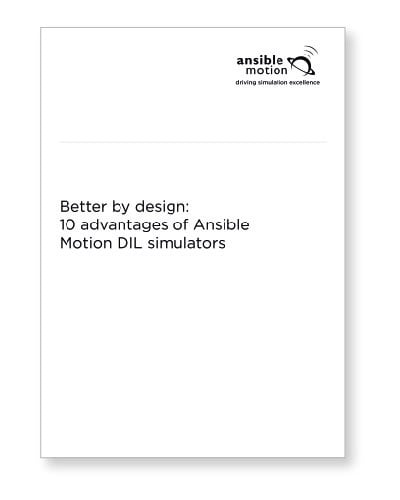 Ansible Motion, manufacturer of driver-in-the-loop (DIL) simulators, and the University of Cambridge’s Engineering Department (CUED) are working together in support of a PhD study into human driver behaviour, funded by Toyota Motor Europe.
Ansible Motion, manufacturer of driver-in-the-loop (DIL) simulators, and the University of Cambridge’s Engineering Department (CUED) are working together in support of a PhD study into human driver behaviour, funded by Toyota Motor Europe.
The industry-academia partnership has set out to compare novice and expert drivers’ steering behaviour during extreme vehicle manoeuvres, in order to reveal distinct learning patterns and control styles.
The simulator
The Delta S3 DIL simulator used in the study creates an immersive environment for collecting precise data on driver responses, and has ultra-low latency and large excursion capabilities to ensure realistic dynamics. With an open and modular software architecture, the simulator can be integrated with sophisticated vehicle and subsystem physics models, hardware-in-the-loop (HIL) test benches and other essential vehicle development toolchains.

The study
For over 25 years, researchers at CUED have examined driver-vehicle dynamics to enhance vehicle design and safety. In this latest study, initial experiments were based on existing experimental track data from an instrumented vehicle where drivers had repeatedly performed identical obstacle avoidance manoeuvres. The data identified differences in steering and learning strategies between drivers. However, the repeated manoeuvres used for the existing data limited the learning on the evolution of a driver’s steering strategy.
To combat this, a new virtual test-driving experiment was devised in which 20 test subjects steered a vehicle along randomly curving paths using Ansible Motion’s dynamic Delta S3 DIL simulator. Software from Ansible Motion’s sister company, rFpro, assisted in generating early results that confirmed differing learning rates between drivers, validating the virtual approach.
The final analysis comparing the real-world data and Ansible Motion’s simulator data with the theoretical model will be completed in late 2025, offering further insights for future vehicle design and driver assistance systems.
David Cole, professor of mechanical engineering at CUED, says:
Cambridge University Engineering Department has been researching driver-vehicle dynamics for over a quarter of a century, aiming to improve vehicle design, performance and safety. Our most recent work, with funding from Toyota Motor Europe, is analysing how novice and expert drivers learn steering control. In order to collect experimental data in a safe and consistent environment, we made the decision to use a driving simulator with immersive motion and graphics. We are very grateful to Ansible Motion for their generous in-kind contribution to the research, by providing access to their simulator software, hardware and technical support.
Dan Clark, managing director of Ansible Motion, adds:
Studies such as this bridge the gap between academia and industry, so we’re proud to support Cambridge University Engineering Department’s ground-breaking research into human driver behaviour. This investigation underscores the role of vehicle simulation in shaping the future of automotive engineering and development.
Read the full article on the Automotive Testing Technology International website.



